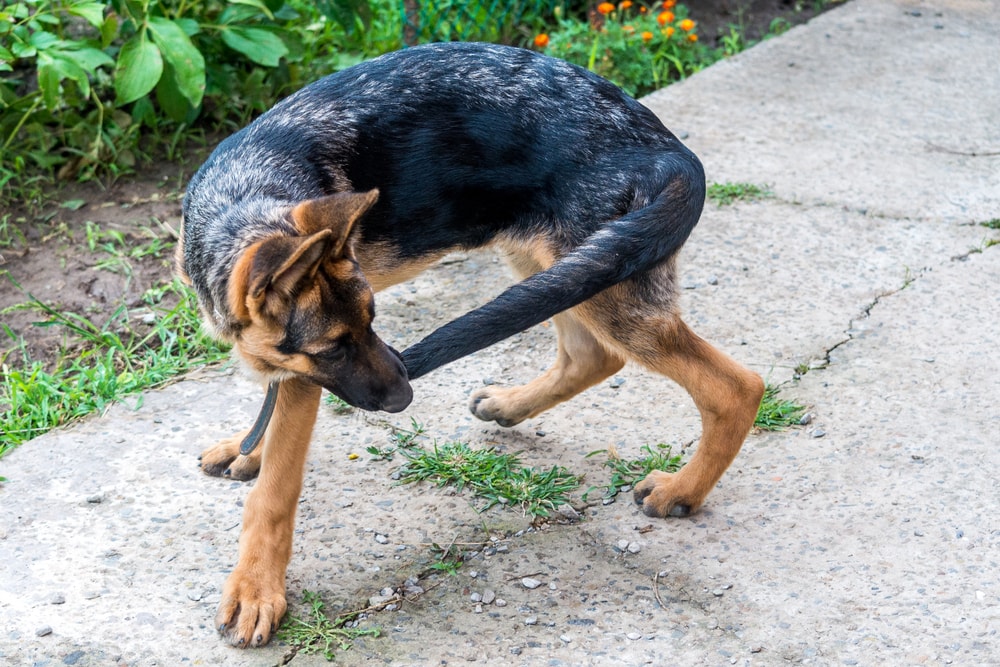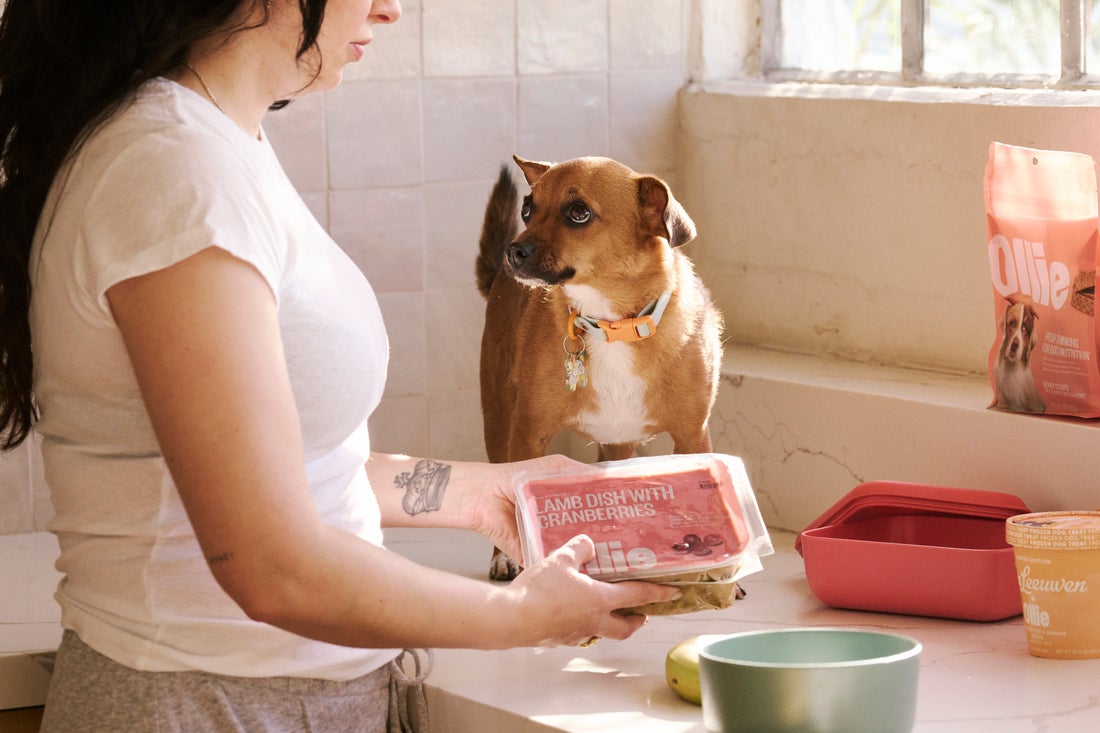Hey Ollie blog readers! We’re offering you an exclusive 60% OFF your starter box! Try now!
Does your pup make a few circles before settling down on his bed, your bed or his favorite spot on the couch? Do you think this is the cutest thing you’ve ever seen? Have you ever wondered why he does this?
There are several theories as to why dogs do this. Some say it is a hereditary behavior from before dogs were domesticated. Dogs used to settle in for the night outdoors in the grass or dirt and the circling would push the grass or dirt down to make it more comfortable or even scratch at it to make it soft so they could get a good night’s rest.
Our dogs still exhibit the same behavior today although instead of grass they’re settling into it is a nice cozy spot on the bed. Your dog may have a nap time or bedtime routine where he scratches at his bedding, does a few circles and then settles down for the night.
While this cute behavior is completely harmless, if you see your dog walking in circles, trying to bite his tail, or circling and unable to settle it might be cause for concern.
Why else might a dog walk in circles?
There are several more serious reasons your pet might walk in circles. If you see your dog walking in circles, unable to stop or is crashing into walls or getting stuck in corners you may want to take him to see the vet for a checkup to rule out the following other conditions.

-
- Stress and Anxiety
Your dog could be walking in circles due to stress or anxiety. This could be brought on by boredom if your dog does not have proper mental and physical stimulation. Consider adding an extra walk, interactive toy or appropriate training exercises to help your pet get appropriate mental and physical stimulation.
Other reasons for this behavior due to anxiety could include Obsessive Compulsive Disorder or your dog could just be anxious. If your newly rescued dog is circling he or she may just need some time to settle in. You may wish to consult with your vet or an experienced dog trainer or behaviorist to help your dog manage stress and anxiety. They may give you some training exercises, behavior modification or even medication to help your pet manage stress and anxiety.
-
- Infections and Parasites
Your pet could be walking in circles due to an inner ear infection which can be uncomfortable. If your dog does have an inner ear infection they may also be itching their ear and the ear may be warm, red and/or have an odor.
Other infections that may cause your pet to walk in circles include parasites which could make their hind end itchy. If you notice that in addition to walking in circles they’re also biting at the base of their tail or rear end you may want to take your dog to the vet to rule out an anal gland issue, infection or parasite that may be causing some itching or discomfort.
-
- Head Injury
If your dog is walking in circles, has dilated pupils, decreased appetite and appears to be in pain if you pat his head he may have suffered a head injury. If you suspect a head injury you want to be sure to get your dog to the vet for treatment right away!
-
- Canine Vestibular Disease
This condition may also be called doggie alzheimers or dimensia. Some of the early symptoms may include pacing, circling or getting stuck in corners. Only a trained veterinarian can diagnose your pet. The doctor will do an exam and potentially some bloodwork or other diagnostic tests to rule out other causes like cancer.
Treatment if your pet is walking in circles
Once you have determined why your dog is walking in circles you can work with your vet and/or trainer to create an appropriate treatment plan to help your pet stop.
Addressing the underlying cause of the behavior is important to help stop it. This is especially true for the behavioral reasons including stress, anxiety and Obsessive Compulsive Disorder. They will require reinforcement and consistency to help your pet overcome the compulsive need to walk in circles. Like any other behavioral issue with positive reinforcement of more appropriate behavior you should see the circling minimize or eliminate. You’ll want to watch your pet carefully for situations that trigger the circling to try to minimize them. If your doctor has prescribed medication it may take some time for it to work. You’ll want to give it some time to make sure it is working correctly. Be sure to stay in contact with your dog’s doctor as the dose may need to be adjusted or you may need to try a few different medications to find the optimal treatment.
In cases of dementia you may need to modify your pet’s environment so they can’t injure themselves if they circle into a wall or sharp corner. You might even want to consider putting mats around your dog’s space to keep him safe. If your pet has dementia they may also need extra supervision and should not be left alone for extended periods.
If the cause of your pet’s circling is medical like an injury or infection, treating the infection or injury should eliminate the behavior in your pet. Your vet will run tests to diagnose the infection and provide a treatment plan. This plan might include a course of antibiotics to treat the infection and pain medicine if your pet is uncomfortable.
If your pet is biting at its tail or rear end and is having issues with his anal glads, a groomer or vet tech will be able to help him express the glands. These glands can become infected and if that has happened your dog may also need medication to treat the infection. Try not to let him ‘scoot’ on the carpet or floor as that can cause additional injury to the area and even bleeding.
If the initial treatment plan does not stop your pet from circling, you will want to see your vet for a follow up to have your pet examined to determine if there is another cause or if another round of treatment is needed.
The Ollie blog is devoted to helping pet parents lead healthier lives with their pups. If you want to learn more about our fresh, human-grade food, check out MyOllie.com.
Tagged As:

The nutrition your dog needs,
the food they want.

Enjoying our articles? Subscribe our Newsletters and get new articles directly to your inbox
You might also like
18 September 2025
5 MINS READ
Can I Rotate Fresh Dog Food Flavors?
Yes, it’s safe to rotate fresh dog food flavors, and many dogs actually benefit from the variety. At Ollie, we offer multiple fresh recipes, like Beef, Chicken, Turkey, Lamb, and Pork so you can…
by Ollie Pets
18 September 2025
5 MINS READ
Is Fresh Dog Food Safe During Power Outages?
Fresh dog food is only safe during a power outage if it has stayed cold, specifically, below 40°F. Once the temperature rises above that point, bacteria can start to grow, and the food may no lon…
by Ollie Pets
18 September 2025
5 MINS READ
How Do I Store Fresh Dog Food While Traveling?
If you’re bringing fresh dog food on the road, keeping it cold is key. The best way to store it is in a cooler with ice packs or a travel freezer. At Ollie, our vacuum-sealed fresh food stays good…
by Ollie Pets








